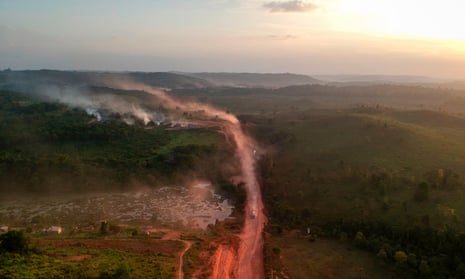Investors managing trillions of dollars in assets have warned Brazil that escalating deforestation and the “dismantling” of policies to protect the environment and indigenous communities are “creating widespread uncertainty about the conditions for investing”.
Amazon destruction rose to its highest level in more than a decade last year, Brazil’s first under the leadership of Jair Bolsonaro, a far-right nationalist who has vowed to develop the region and slash environmental protections.
And on Tuesday, in the latest chapter of an intensifying international pressure campaign, institutions from countries including the US, the UK, Norway and Japan told Brazil’s leaders the devastation – which has continued to increase this year – had to stop.
“It is with deep concern that we follow the tendency of increasing deforestation in Brazil,” the group, which manages $3.7tn (£3tn) in assets, said in a letter to the Brazilian government.
“As financial institutions, who have a fiduciary duty to act in the best long-term interests of our beneficiaries, we recognize the crucial role that tropical forests play in tackling climate change, protecting biodiversity and ensuring ecosystem services,” the letter added.
Jeanett Bergan, the head of responsible investment at KLP, Norway’s largest pension fund and one of the letter’s 29 signatories, told the Guardian it was intended to signal to Brazil’s leaders that “what is happening there is going in the wrong direction”.
“We have very strict guidelines for our investments in terms of if there is an unacceptable risk of contributing to serious environmental degradation or human rights violations then we need to consider divestment. And what is currently happening in Brazil is very alarming and poses a high risk for both environmental degradation and human rights violations,” Bergan said. “That is why we have to work very seriously with this issue.”
The group – whose signatories also include Legal & General Investment Management and the Church of England – expressed concern over controversial legislative proposals to legalise occupation of public lands and forests and a Bolsonaro-backed push to open indigenous lands to commercial mining.
They also highlighted recent remarks from Bolsonaro’s environment minister, Ricardo Salles, suggesting Covid-19 provided good cover to push through deregulation since journalists were distracted.
“[We] urge the government of Brazil to demonstrate clear commitment to eliminating deforestation and protecting the rights of indigenous peoples,” the investors wrote.
The letter comes after seven European investment firms last week announced they would divest from beef producers, grains traders and even government bonds in Brazil. “The trends we’ve seen in Brazil are very concerning,” Daniela da Costa-Bulthuis, Brazil portfolio manager for Netherlands-based asset manager Robeco, told Reuters.
Over the past year, the Guardian has published a series of investigations showing the close link between the beef industry in Brazil and the deforestation of the Amazon. In December, a Guardian analysis showed that the fires which had burned in the rainforest were three times more likely to occur in beef farming zones.
International condemnation of Bolsonaro’s handling of the environment, which reached a crescendo during last year’s Amazon burning season, has sparked some reaction from Brazil’s government.
In January, Brazil announced the creation of an “Amazon Council” supposedly tasked with defending the world’s largest rainforest and placed vice-president Hamilton Mourão in charge of those efforts.
But Rubens Ricupero, Brazil’s former environment minister, said he suspected the anti-deforestation plan was little more than “pure public relations” designed to hoodwink the world.
“I am very sceptical,” Ricupero said, noting that the “disastrous” increase in deforestation had continued this year.
“These are not small increases. These are gigantic increases – and so far there are no facts that would justify thinking that the government is genuinely concerned about this,” Ricupero added.
“Even if the government now manages zero deforestation [for the rest of 2020], this year will still be worse than last year. And no Brazilian government has ever managed zero deforestation, no matter how hard they have tried in the past.”
Ricupero said pressure from international investors would be a mid-term worry for Bolsonaro’s administration as it looked to rebuild Latin America’s biggest economy with a series of major post-pandemic infrastructure projects.
“Right now, there is no investment, from Brazilians or foreigners. But the concern is that as the pandemic begins to weaken, the government will want to revive the economy … and for that the government will need to be able to attract investments from overseas.”
